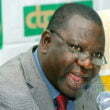Professor Oliver Saasa says the skepticism in investor confidence following the appointment of Margaret Mwanakatwe as Finance Minister is understandable because the international community had confidence in Felix Mutati’s administration.
Professor Saasa who is Premier Consult Limited chief executive officer explained to News Diggers in an interview that investors were in doubt after the appointment of Mwanakatwe to her new role because they were hopeful that the IMF package through negotiations by Mutati would pull through.
He said it was likely that most investors would withhold their money out of nervousness until they were sure that Mwanakatwe would maintain the same approach on investor relations.
“The market is sensitive to any development in a country, not only Zambia, but where those developments, be it political, economic or otherwise, may have an effect on the stability of government policy and the predictability of government policy positions. Essentially, what it means is that if something, whether it’s the President who has died or there is a major change of government in terms of ministers, you will expect the market to be nervous because that is a natural reaction. Now, it’s even more so where the changes are interpreted by those that are market players that the changes are not in the interest of their expectations. Such is another aspect where the market nervousness would be seen,” Professor Saasa explained.
“Markets always get nervous when a promising person whose stance publicly was in favour [of many], like in this case and if that person is removed midstream. What that will mean is that everybody has to rise now and see whether the new Minister of Finance would pursue the position that everybody had come to be aware of. The position of Honourable Mutati where he argued in the midst of challenges from some of the colleagues in cabinet.”
He said international economic observers had their eyes fixed on Zambia, waiting to see the direction in which the new minister would steer the economy, knowing that the country’s coffers were stressed.
“One of the most important things about the IMF for our programme and the Zambian desire to have this programme is that right now the government coffers are stressed. You are aware that the government is unable to meet a number of obligations. But perhaps most importantly at a national level, meeting domestic debt. There are many service providers, contractors for example that have provided services, whether in terms of road construction or with respect to the construction of other government buildings we’ve seen. Government is somewhat stressed to meet these obligations which of course means that there is a challenge now that requires the entry of the IMF. Now, Honourable Mutati excelled fairly well and he earned a certain level of respectability. But this has nothing to do with Honourable Mwanakatwe because she (Mwanakatwe) is yet to be known on how good or bad she is,” he said.
Professor Saasa said Zambia desperately needed the IMF bailout, not for the money but for the structural conditionalities that would instill fiscal discipline on the part of government.
“Now, this package is not only about money and this is where many people miss it. You are talking about $1.3 billion over a three-year period, if you divide that, you will find that the money that we are talking about is not very substantial. It’s less than K500 million, it’s substantial but not very substantial as to be the main reason why we need the IMF package. The main reason why we need the IMF package is because it’s structural lending. It comes with structural changes attached to it which we sometimes refer to as conditionalities. It brings in some level of fiscal discipline and expectations from the investor community, from government, from the opposition and civil society,” he said.
And Professor Saasa said it is expected that most investors would hold on to their money until they were confident Mwanakatwe would not fail them.
“So the IMF are expected to come with conditions that would make government be a little prudential in the application and accountability of public resources. People are looking up to that now and for investors, its the same thing. The investors because they were very hopeful that the IMF package was coming up, now we may see that a number of them will have to wait and see, they will be nervous until they are sure that the lady who is replacing Mutati would maintain the same stand,” said Prof Saasa.
“What usually happens when there is a change is that people withhold money until they are clear. These are investors, they wouldn’t want to put money in a country where the policy is not clear. Because of that, you will see reluctance by the investors to put money until they are sure, reluctance by the cooperating partners until they are sure we are doing the right thing. Reluctance from the multilateral institutions like the IMF themselves especially with respect to the debt. Debt sustainability suggests that we are severely indebted and where we are it’s just under 50%, in fact some figures put it at 60% of GDP. That is too high, that is unsustainable and everybody was looking up to Mutati to help out with the situation. So this nervousness amongst investors is because they had confidence in Mutati, it does not in any way suggest that there is no confidence in Mwanakatwe but it just means that there are times when you have to be very careful when you change your lieutenancy, because if you change at a particular time, you must actually be ready to manage the fall out and this actually is what I have seen.”











